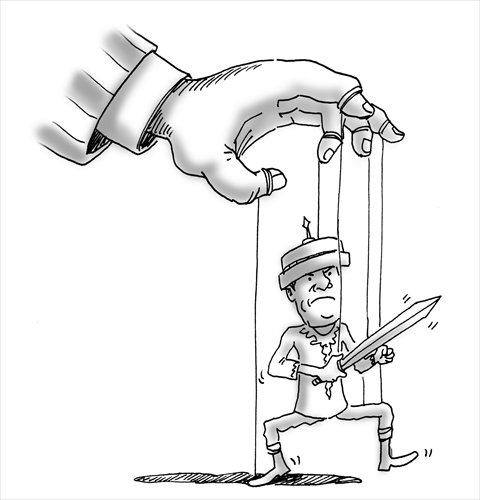Manila puppet of US in dispute with China

Illustration: Liu Rui/GT
This year marks the 40th anniversary of the establishment of diplomatic relations between China and the Philippines, but simmering tensions over territorial disputes have overshadowed bilateral ties. During Benigno Aquino's five-year administration, the Sino-Philippine relationship has hit a trough it hasn't seen in 40 years, especially after a "golden age" of bilateral ties when Gloria Arroyo was in power.
A strained bilateral relationship does no good to both sides, especially the Philippines. The Aquino government can hardly absolve itself from the predicament. However, if Manila is also a victim in the unpleasant situation, why wouldn't Aquino abandon the aggressive policy against China?
It is incorrect to judge Aquino as being incompetent and ignorant when his government adopted its current China policy. A retrospective of how hostility grew between Beijing and Manila in the last five years will reveal that by keeping meddling and manipulating the situation through its leverage on the Philippines, the US is the biggest beneficiary of the rows.
At the beginning of his administration, Aquino had no intention to challenge China. At a meeting in the National Defense College of the Philippines in 2010, Aquino declared that his government would maintain amicable relations with the US, China and other Southeast Asian countries, and he even promised that US military forces couldn't stay in the southern part of the Philippines for long.
In 2010, as the only cabinet member who was kept after Aquino was elected, former secretary of the foreign affairs Alberto Romulo responded to then US secretary of state Hillary Clinton's hinting at a greater involvement of the US in the South China Sea disputes, saying the negotiations do not need the US or any other party. The statement shows that, back then, Aquino was still trying to continue his predecessor's foreign policy featuring a balance among major powers.
However, Washington never gives up breaking the balance. With many tricks, it is eager to re-forge the Philippines as a frontline base for its pivot to Asia.
Washington sent senior government officials and military officers to pay frequent visits to the Philippines in July and August 2010. Then US undersecretary of state for political affairs William Burns said Washington insisted on keeping a US garrison in the southern part of the Philippines, and Robert Willard, then commander of the US Pacific Command, hyped China's threat in the South China Sea disputes.
After the squabble between China and the Philippines about the Manila hostage crisis in April 2010, Aquino's attitude toward China started to change. After his first state visit to the US in September, Aquino recalibrated his policy about US involvement in the South China Sea, saying the disputes should be resolved through diplomatic channels with all relevant parties involved.
After former Philippine ambassador to the US Albert del Rosario replaced Romulo as the new secretary of foreign affairs, he started to direct the Sino-Philippine relationship into an abyss. As a pro-US politician who wanted to be a pawn for the US rebalancing to Asia, Rosario tried every means to smear China to Aquino.
For example, when the dispute over the Huangyan Island emerged, Rasario manufactured the information that China and the Philippines had agreed to withdraw ships around the island at the same time, and then blamed China for breaking its promise. Aquino developed a deep mistrust of China due to Rosario's nasty tricks.
But when he realized that Rosario was misleading him, he sent special envoys in secret, bypassing Rosario, to China and conducted honest and direct connections with China. However, Aquino's plan was futile as Rosario threatened to resign.
Washington understands that China and the Philippines have a long history of amity, and there is great potential for cooperation. In order to wave such thoughts away from Aquino's mind, Washington has exerted itself in order to sensationalize the disputes in the South China Sea.
For example, after a brief visit to Beijing for the APEC late 2014, Aquino released signals to restore Sino-Philippine relations. The US, which pretended to be neutral in the South China Sea, took immediate actions by deploying quite a few high-ranking senators to criticize China's reclamation of some reefs and islets. Exaggerating the speed and size of the reclamation, the US wanted to plant fear in the Philippines and other Southeastern Asian countries. Unfortunately, Manila fell into the trap and stood beside the US.
Besides these political and diplomatic tricks, the US offered various aids and made plenty of promises to rope Manila in its grand strategy in the Asia-Pacific. However, Manila should be sober and realize that breeding enmity against China will make itself the only victim. Its trade with China is falling and its sovereignty is being breached again by US soldiers, who want to come back like in the Cold War.
It is time that Manila cut the strings and stop being a marionette.
The author is a research fellow at the China Institutes of Contemporary International Relations. opinion@globaltimes.com.cn